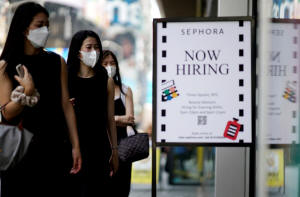School hiring decline, worker shortages curb U.S. job growth in
September
 Send a link to a friend
Send a link to a friend
 [October 09, 2021] By
Lucia Mutikani [October 09, 2021] By
Lucia Mutikani
WASHINGTON (Reuters) - The U.S. economy
created the fewest jobs in nine months in September amid a drop in
hiring at schools and worker shortages, but ebbing COVID-19 cases and
the end of generous unemployment benefits could boost employment gains
in the months ahead.
Though the Labor Department's closely watched employment report on
Friday showed the unemployment rate dropping to an 18-month low of 4.8%,
that was in part due to people leaving the labor force. But there were
signs of labor market tightness. Wage gains accelerated further,
permanent job losses decreased and fewer people were experiencing long
spells of unemployment.
"The biggest problem is not that growth has slowed, it is that people
are still scared to go back to work," said Brad McMillan, chief
investment officer for Commonwealth Financial Network.
The survey of establishments showed nonfarm payrolls increased by
194,000 jobs last month. Data for August was revised to show 366,000
jobs created instead of the previously reported 235,000 positions.
Employment is 5.0 million jobs below its peak in February 2020.

Economists polled by Reuters had forecast payrolls would increase by
500,000 jobs, with estimates ranging from as high as 700,000 jobs to as
low as 250,000. The unemployment rate of 4.8% was down four-tenths of
percentage point from August, while average hourly earnings increased
0.6% from 0.4% in August. The average workweek also lengthened by 0.2
hours to 34.8 hours.
Employment gains were restrained by a drop of 161,000 in state and local
government payrolls. Private education jobs fell by 19,000. Most
back-to-school hiring typically occurs in September, but recruitment
last month was lower than usual, resulting in a decline after stripping
seasonal fluctuations from the data. Pandemic-related staffing
fluctuations in education have distorted the normal seasonal patterns,
making it difficult to interpret the data, the government said.
The drop in public education jobs led to a decrease of 123,000 in
government employment. That was offset by an increase of 317,000 in
private payrolls.
Employment in leisure and hospitality rose by 74,000 in September, with
hiring at restaurants and bars rising 29,000. There were also gains in
professional and business services payrolls. Retailers hired 56,000
workers, while manufacturers added 26,000 jobs. Construction payrolls
rose by 22,000 jobs.
With wage inflation rising, September's meager payroll gains probably
will not deter the Federal Reserve from beginning to scale back its
massive monthly bond-buying program this year.
The U.S. central bank signaled last month that it could start tapering
its asset purchases as soon as November. Economists expect that
announcement will come at the Nov. 2-3 policy meeting.
"The bar was always quite low for a tapering of asset purchases to be
announced in November and the combination of upward revisions, the drop
in the unemployment rate, and signs of labor market tightness should
more than meet it," said Andrew Hollenhorst, chief U.S. economist at
Citigroup in New York.

[to top of second column] |

A sign advertising job openings is seen while people walk into the
store in New York City, New York, U.S., August 6, 2021.
REUTERS/Eduardo Munoz/File Photo

The likelihood of a taper was bolstered by the U.S. Senate agreeing on Thursday
to raise the Treasury Department's borrowing authority until December.
Stocks on Wall Street were mixed in choppy trade. The dollar slipped against a
basket of currencies. U.S. Treasury prices fell.
MIXED SIGNALS
Despite the modest jobs gain, accelerating wage growth bodes well for the
economic outlook, following an apparent sharp slowdown in growth in the third
quarter.
The economy hit a speed bump last quarter because of the summer flare-up in
coronavirus cases, an ebb in the flow of pandemic relief money from the
government, scarce labor and raw materials, which have hammered motor vehicle
sales.
The Atlanta Fed estimates that gross domestic product growth braked to a 1.3%
annualized rate in the July-September quarter. The economy grew at a 6.7% pace
in the second quarter.
But with COVID-19 infections decreasing and schools fully reopened for in-person
learning, more people should be able to rejoin the labor force. In the months
ahead, the labor squeeze could ease following the expiration of federal
government-funded benefits in early September.
These expanded benefits were blamed by businesses and Republicans for the
failure to fill a record 10.9 million job openings as of the end of July. So
far, many of the unemployed appear to be in no hurry to start looking for jobs,
having saved a chunk of their government money.
The smaller household survey from which the unemployment rate is derived showed
183,000 people left the labor force in September. As result, the labor force
participation rate, or the proportion of working-age Americans who have a job or
are looking for one, dipped to 61.6% from 61.7% in August.
Some economists say a significant portion of people who dropped out of the labor
force have retired, thanks to a strong stock market and record house price
gains, which boosted household wealth. Self employment has also increased.

"Labor supply remains an important constraint and an issue that may very well
not get resolved in a short time horizon," said Ellen Zentner, chief U.S.
economist at Morgan Stanley in New York.
Even though participation remains low, some aspects of the labor market are
improving. The employment-to-population ratio, viewed as a measure of an
economy's ability to create employment, rose to 58.7% from 58.5 in August.
The number of long-term unemployed dropped by 496,000 to 2.7 million in
September. They accounted for 34.5% of the 7.7 million officially unemployed
people, down from 37.4% in August. The median duration of unemployment fell to
13.3 weeks from 14.7 weeks in August.
(Reporting by Lucia Mutikani; Editing by Chizu Nomiyama and Paul Simao)
[© 2021 Thomson Reuters. All rights
reserved.] Copyright 2021 Reuters. All rights reserved. This material may not be published,
broadcast, rewritten or redistributed.
Thompson Reuters is solely responsible for this content. |